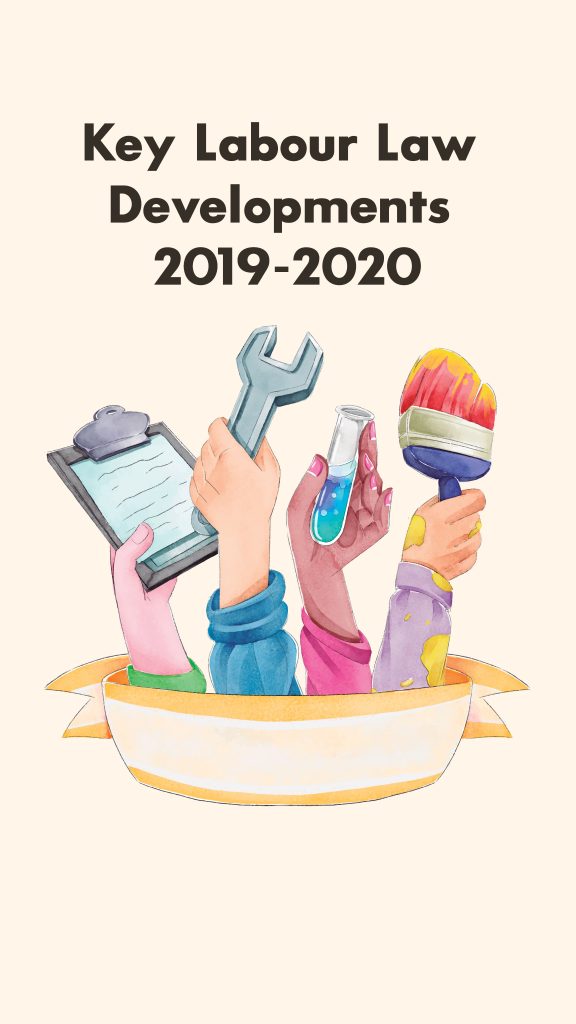The year 2019-2020 saw some major changes in the fields of labour laws, social security and employment in India. These changes are bound to affect everyone, from the layman to the businesses. This article reviews all key labour law developments during the period of the past year and brings forth noteworthy points for your understanding.
Table of Contents
Key Labour Law Developments 2019
April 2019
PF pension on full wages
- Notification No. GSR 609(E) issued by the EPFO amended the EPS. It stated that any employee joining post 1st September 2014 and earning over Rs 15,000/per month was not eligible for a monthly pension under EPS.
- The Kerala High Court ruled against this Notification No. GSR 609(E) in its October 2018 judgement. The court ruled that the government did not have the power to set a cut off date for employees joining the EPS. This notification would create different classes of pensioners based upon joining of date, which was not in the power of the government.
- The EPFO petitioned the Supreme Court regarding Kerala High Court’s ruling. But the Supreme Court upheld the High Court’s decision dismissing the special leave petition on 1st April 2019.
- But since then there have been no updates on this amendment.
EPF interest rate of 8.65% for FY 2019
- The government reviews the interest rate applicable to the EPF for salaried individuals on a yearly basis.
- For the fiscal year 2018-19, the Labour Ministry notified the EPF interest rate as 8.65%.
- This rate of interest was 10 basis points higher than 8.55% for the fiscal year 2017-18.
- The payment of EPF interest which usually happens in April-May was delayed to October-November. The reason given for this delay in payment was financial difficulties related to unfavourable equity investments made by the EPFO.
- 2020 EPF interest payment may face some difficulties as well due to the economic downturn since the coronavirus lockdown.
May 2019
Online portal, Samadhan, launched for filing industrial disputes
- The Labour Ministry launched an online portal called Samadhan.
- This portal was aimed at the filing of disputes by the employees and employers.
- A beta version of the portal was launched in Delhi, Rajasthan, Chhatisgarh, Karnataka and Odisha. Furthermore, other states have still not received access to this portal.
- E-dispute portal for filing disputes by employees/employers launched by the Secretary (Labour and Employment)
- Launched on a pilot basis in Delhi, Rajasthan, Chhattisgarh, Karnataka and Odisha
Online pension claims filing enabled
- The EPFO launched a new service on the unified member portal which enabled online filing of pension claims by members. Earlier, members had to file a written physical form to enable pension claim. Learn the full process in detail in PF Monthly Pension Application Online Tutorial.
- The facility to file composite claims was also launched for the family members or the nominee of a deceased member. This will be helpful in quickly providing benefits to the deceased member’s family.
June 2019
ESI contribution rate decreased to 4%
- The government reduced the ESI contribution from 6.5% to 4%.
- Hence, the employers’ contribution reduced from 4.75% to 3.25% & the employees’ contribution reduced from 1.75% to 0.75%.
- Furthermore, this was applicable to employees with a salary of less than Rs 21,000 per month.
- This move was expected to increase the take-home salary of the employee as well as reduce the financial burden on the employers. The revised ESI contribution rate came into effect from October 2019.
July 2019
RTI Amendment Bill 2019
- Although the RTI Act was working fine, the government introduced an RTI amendment bill. This bill removed statutory protection of tenure, salaries, allowances and conditions of service of Chief and Information Commissioners of Central Information Commission.
- The bill states that the salaries, allowances, and other terms and conditions of service of the Central and State CIC and ICs will henceforth be determined by the Central Government. Thus, giving the government an undue advantage over CIC and ICs.
- Despite much opposition, the bill was passed in the Parliament. Learn more on this in RTI Act | Key Features, Online & Offline Procedures, RTI Amendment Bill 2019.
Labour Law Codes
- Four new labour codes were introduced in the Parliament.
- Code on Wages 2019 was passed and notified into an Act by the President. Its rules are awaited though.
- The Code on Social Security, Industrial Relations Code and the Occupational Safety, Health and Working Conditions Code were referred to a Parliamentary Standing Committee. These are yet to be passed. Discussion on its changes and improvements are still going on.

August 2019
Code on Wages Act 2019
- The Code on Wages Act saw a clear definition of wages.
- Definition of wages is now unified. It has three parts to it – an inclusion part, specified exclusions and conditions which limit the quantum of exclusions.
- Moreover, total allowances cannot exceed 50% of the basic salary now.
- This also set a national floor rate for Minimum Wages by the Central Government. Thus, no State Government can set a lower minimum wage than this. Read more on this in Code On Wages Bill, 2019 | Complete Analysis.
Restoration of commuted pension
- The Central Board of Trustees meeting approved the restoration of pension for commuted pensioners.
- This enabled commuted pensioners who had partially withdrawn a lump-sum during their retirement and were later receiving a reduced pension, to get restored pension to their full amount.
- This would benefit some 6.5 lakh pensioners.
- It has now been implemented and you can learn more about it in EPF/Pension Decisions From The Central Board Of Trustees Meeting.
EPF Act applied in Jammu & Kashmir
- After the abolition of Article 370 in Jammu and Kashmir, all national-level acts implementation began in the region.
- Earlier, workers in Jammu and Kashmir were governed by its EPF Scheme of 1961 and the Employees’ Deposit Linked Insurance (EDLI) Scheme of 2000.
- But now Jammu & Kasmir employees are eligible for a series of social security benefits ranging from family and disability pension to higher life insurance, higher PF interest rate and electronic transactions under the EPF Act.
- It also reduces the employee cost for companies administrative charges of EPFO to fairly low.
September 2019
ESI beneficiaries get treatment under Ayushman Bharat Yojana
- Beneficiaries of the ESI scheme will be able to get treatment under Ayushman Bharat Yojana. This will especially be applicable in regions with inadequate ESI hospitals.
- It will be implemented in states where Pradhan Mantri Jan Arogya Yojana (PMJAY) has been adopted.
- ESI beneficiaries will be dealt through PMJAY logistics/IT facilities for registration, billing and other services and medical expenditure. Same procedure as is done for PMJAY beneficiaries, up to a limit of Rs 5 lakh.
- Beyond Rs 5 lakh, an individual case will be channelled to the ESIC for approval for further expenditure.
- In the long run, ESI and Ayushman Bharat Yojana are expected to be merged. Read more on this in ESIC General Meeting Announcements.
National Pension Scheme launched
- A National Pension Scheme was launched for traders and self-employed individuals.
- This scheme was eligibility for individuals of 18 to 40 years.
- Self-employed shop owners, retail owners and other vyaparis (traders) having an annual turnover of less than Rs 1.5 crore could join this scheme. Upon the condition that they were a member of ESIC, EPFO or PM-SYM.
- This gave a minimum assured monthly pension of Rs 3000 to members on attaining the age of 60 years.
- It was a first-time pension scheme for self-employed people.
October 2019
ESI changes with effect from 1st October 2019
- Employees must be registered online on the date of appointment.
- The online system shall allow only a maximum of 10 days to register the new employee.
- Contribution against an employee must be deposited within the due date. Employer shall not be able to deposit contribution online after 42 days from the end date of the contribution period.
- Learn more on this in ESIC Return Date Extended | New ESI updates 2020.
January 2020
Online date of exit facility
- EPFO launched an online facility where EPF account holders can update their own exit date, i.e., date of leaving an organisation in the EPFO records.
- Whereas earlier, this date of exit could only be updated by the employer.
- This was a substantial move since if the exit date is not available on the EPFO records then an EPF account holder cannot withdraw money from his EPF account or transfer even the account from previous organization to new one.
- Learn the full process in How To Mark Date Of Exit Without Employer | New PF Feature.
PPOs, UAN cards available on DigiLocker
- DigiLocker is an online wallet launched by the government.
- It enables user to save soft copies of all their important documents like Aadhaar, PAN, etc.
- These can furthermore be presented as a valid identity proof anywhere, anytime.
- DigiLocker will now be able to save Pension Payment Orders (PPOs) and UAN.
- This will enable a large number of pensioners and PF members to download their documents and avail timely benefits.
February 2020
Introduction of new tax slab rate
- The Budget brought about new income tax slab rates for salaried employees.
- Individuals have the option to either continue with the previous slab rates or opt for the new one.
- The new slab rates do not allow many exemptions and deductions. More details on this in Budget 2020 Analysis | Decode New Tax Rates | Highlights.
Employer’s contribution to PF over Rs. 7.5 lakh set to be taxed
- It is proposed to put an upper cap of Rs 7.5 lakh in a year on tax-exempt employer’s contribution in recognised provident fund, superannuation fund and NPS in the accounts of an employee.
- The proposed amendment will be effective from 1st April 2021 and will apply from the assessment year 2021-22.
- This was done since PF contribution does not have any tax rebate.
March 2020
EPF interest rate decreases to 8.5%
- EPFO cut the interest rate to 8.5% for FY 2019-20, a seven-year low.
- The new rate is 15 bps below the figure for the previous fiscal year.
- The interest rate of 8.5% for EPF balances is still the highest amongst all government savings schemes for employees.
COVID-19 lockdown measures
- On 29th March 2020, a notification released by the Labour Ministry set out certain rules for the lockdown period.
- It stated that all employers in industries, shops or commercial establishments, have to pay their workers their salary in lockdown. The salary should be paid within due date and without any deduction.
- The Pradhan Mantri Garib Kalyan Yojana (PMGKY) was enabled to where the Central Government plans to pay the full 24% EPF contribution for the next 3 months for workers who earn below Rs 15,000/month.
- ESIC has given employers an extension for filing ESI returns for February and March 2020. ESI contribution for February can be paid by 15th May and for March can be paid by 15th May.
- Many Central Labour Returns have also given an extension for payment.
View the complete list of key labour law developments in the video below.
Join the LLA telegram group for frequent updates and documents.
Download the telegram group and search ‘Labour Law Advisor’ or follow the link – t.me/JoinLLA
It’s FREE!


